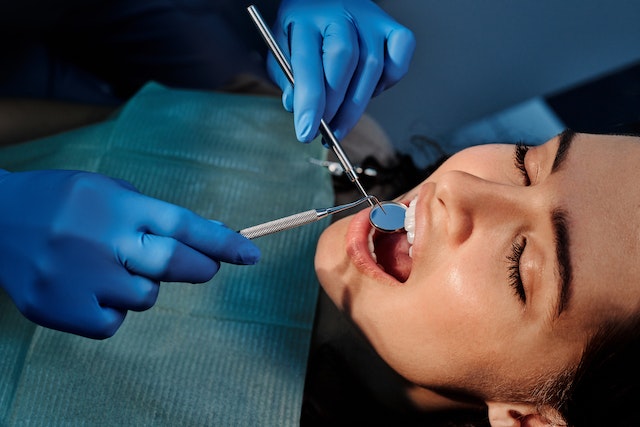
Are you struggling with an underbite and wondering whether it’s worth seeking treatment?
An underbite is not merely a cosmetic concern; it can cause long-term damage to your teeth and jawline, leading to structural deficiencies and a host of uncomfortable symptoms. An undiagnosed or untreated underbite can significantly impact your dental health and overall well-being, from headaches and earaches to poor alignment and difficulty speaking. Fortunately, several treatment options are available to fix an underbite, and seeking treatment is crucial to prevent these problems from becoming more severe.
What is an underbite?
An underbite, a Class III malocclusion or prognathism, is a dental condition in which the lower jaw protrudes outward beyond the upper teeth. Underbites can range in severity from a mild misalignment to significant dental problems requiring extensive treatment. This misalignment can affect the individual’s oral health and general well-being. Below are various health implications that are effects of an underbite:
Temporomandibular Joint Disorder
An underbite can cause problems with your temporomandibular joint (TMJ) and lead to the development of the temporomandibular joint disorder (TMD). TMD can cause jaw pain, difficulty opening and closing your mouth, and clicking or popping sounds when you move your jaw. In severe cases, TMD can lead to chronic headaches and neck pain.
Chronic Bad Breath and Periodontal Problems
When you have an underbite, bacteria can build up in your mouth and cause chronic bad breath. This is because the lower teeth might overlap the upper teeth, creating a space where food particles and plaque can accumulate. If left untreated, this can lead to abnormal tooth wear and tear, leading to chipping, cracking, and even tooth loss, gum disease, tooth decay, and other oral health issues.
Mouth Breathing
An underbite can also lead to mouth breathing, which can cause many problems. When you breathe through your mouth, you are not using your nose and throat to filter and moisten the air you breathe. This can lead to dry mouth, sore throats, and an increased risk of respiratory infections. Mouth breathing can also cause poor sleep quality and contribute to snoring and sleep apnea.
Sleep Apnea
Sleep apnea is a condition that causes pauses in breathing during sleep. It can be caused by many factors, including a small or recessed jaw, often associated with an underbite. Sleep apnea can lead to fatigue, daytime sleepiness, and a higher risk of accidents or injuries. It can also contribute to heart disease, high blood pressure, and other serious health problems.
Speech and Chewing Problems
Finally, an underbite can make it difficult to speak and chew properly, leading to digestion problems. You might find it challenging to pronounce certain words and experience discomfort or pain when eating, which can lead to poor nutrition and even malnutrition if left untreated.
The severity of an underbite condition is the primary factor determining the most effective treatment option. Mild cases may require minimal intervention or non-surgical underbite correction. On the other hand, underbites of significant magnitudes can cause structural and functional issues that require more invasive treatment. Below are some prevalent treatments for underbite correction in Sydney:
- Orthodontic Treatment: In many cases, orthodontic treatment is the first line of treatment for underbites. Braces or invisible line orthodontic systems like Invisalign treatment can gradually shift the teeth into the correct position. This treatment can take several months or even years, depending on the severity of the underbite.
- Jaw Surgery: Orthodontic treatment alone may not be enough for more severe cases. Jaw surgery may be necessary to correct the underbite. During this procedure, the jawbone is repositioned to align the teeth correctly. This treatment is often combined with orthodontic treatment to achieve the best possible result.
- Chin Cap: For children with a mild underbite, a chin cap may be used to encourage the lower jaw to grow forward. This device is typically used for children under ten and is worn several hours daily.
- Palatal Expanders: Palatal expanders are also used to treat underbites in children. This device is placed in the upper jaw and gradually expands the jaw’s width, which helps to align the teeth and improve the bite. It is usually worn for about six months to a year.
- Tooth Extraction: In some cases, removing one or more teeth may be necessary to create enough space in the mouth for the teeth to shift into the correct position. This is typically only done in severe cases and is usually combined with underbite correction with braces.
Underbite goes beyond being just a cosmetic problem. Severe underbite teeth can result in various health issues, from chronic bad breath and sleep apnea to difficulties with speech and chewing. It’s essential to consult a dental professional for a thorough evaluation and to determine the most suitable treatment for an underbite. Proper treatment can improve your oral health, boost your confidence, and enhance your overall quality of life.
Don’t let an underbite hold you back from feeling confident in your smile – explore the treatment options available to you.

